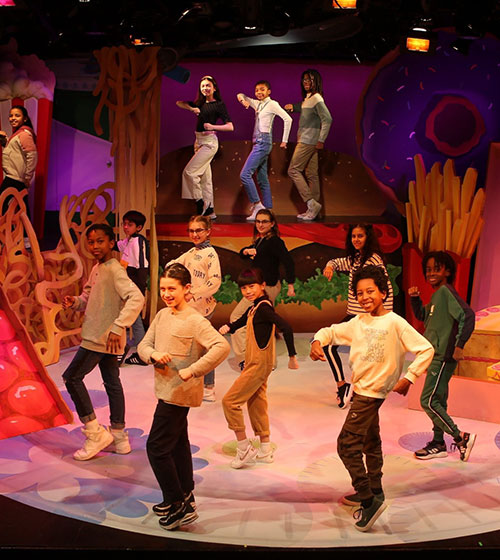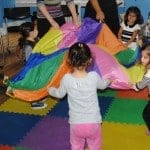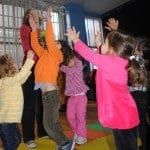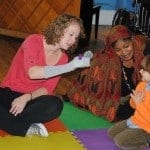
Small Grant for TADA! Because Every Child Deserves a Stage
A very special children’s theater school called TADA! just became the recipient of a small grant from Kars4Kids. We wanted to help TADA! because Kars4Kids is a willing partner to anything that helps children grow and blossom as they should. And we already knew that musical theater could do just that.
After all, we’ve twice covered on the blog the benefits of drama and performance for young people.
Yeah. We wanted to be part of that mission. So now we are.
Kars4Kids spoke to Co-Founder, Executive and Artistic Director of TADA! Janine (Nina) Trevens, to find out how she ended up creating this amazing theater for children and to learn about the theater itself. Our hope in sharing this interview is that others will be inspired to start theater companies for children in their own areas. Because doesn’t every child deserve a stage?
Kars4Kids: When did you first have the idea to open a children’s theater school and how long did it take until you were able to open? Tell us a bit about that process.
Nina Trevens: I worked as a stage manager in theater for a number of years but I wanted to work with children which was my passion. I saw how that was possible when I ended up working as the production stage manager at The First All Children’s Theater for a number of years but I wanted to direct and that wasn’t a possibility there.
I went back to stage managing adult theater and got a job as a stage manager on a show which was part of a festival. The producer wanted to do all different kinds of theater. My Mom, Francine Trevens, was directing a different show in that festival and she told the producer that I had a children’s theater company which I didn’t at the time. The producer asked me for a proposal—what would my children’s theater be able to do in this festival?
I asked a choreographer friend, Linda Reiff, to partner with me to write the proposal. We went away for the weekend and came up with a dance piece and a new musical that we would be able to do as part of the festival. The producer accepted the proposal and so TADA! began in the summer of 1983.
We were given the space, equipment, and marketing. Linda and I found contributors and staff and cast the show. Once that production ended, Linda and I decided we wanted to continue with TADA! so then we went through the process to become a not-for-profit theater company – that took a year – and we continued to produce original musicals and dance pieces performed by kids for family audiences.
Kars4Kids: What was the first musical you performed? How many children were enrolled that first year? 
Nina Trevens: The first musical was The Little House of Cookies and it was done in conjunction with a dance piece entitled, The Odd Ball. The cast was comprised of 15 kids ages 8-17.
Kars4Kids: How many kids are currently enrolled in the regular 8-18 TADA! program?
Nina Trevens: The ensemble is currently comprised of 86 members.
Kars4Kids: Tada! holds musical theater classes for ages 1-2. Now that’s intriguing. The babies must love this! What exactly do you do with the babies? What is the aim of this class?
exactly do you do with the babies? What is the aim of this class?
Nina Trevens: Our class for age 1-2 is called Creative Musical Play. It is a chance for moms, dads and caretakers to have a play date with their little ones and their friends. The adults get in on the action while watching their child learn rhythmic coordination, language and storytelling skills through song.
Kars4Kids: You have some pretty big names on your artistic advisory board. Chita Rivera and Leslie Uggams, are for instance, recognizable names. How did you manage to enlist their help? It must take some courage to approach the big names.
Nina Trevens: Many of the people on the Artistic Advisory Board I had worked with in the past so I just asked them if they would lend their names in support of TADA! and they said yes. I guess it took courage—I’ve been told that I’m a brave person but I just knew what I wanted and I knew how much TADA! meant to me so I asked people to be a part of TADA!.
Kars4Kids: The range of programs you have is quite impressive. It’s hard to know how TADA! manages it all. Have you done a count of all the programs you do? How many full time staffers do you employ?
Nina Trevens: Thank you. I haven’t actually done a count of all the different specific classes/camps/residencies/shows/ensemble events and ensemble classes we do yearly. I think of TADA! as two main programs—the two main arms of TADA! are The Theater/Ensemble Department and The Education Department. TADA! has 8 full-time staff members, 6 year-round part-time, over 40 Teaching Artists and another 15 -25 people hired on a per production basis.
Kars4Kids: Does the TADA! program, being free, target children from lower income homes? Can you tell us about some of your graduates: what they came from and where they are now? We’d would love to hear about your most successful students. We noted Ricky Lake, for instance.
Nina Trevens: Not at all. The ensemble Program does not actually target children from any specific income bracket. In fact, the goal of the Ensemble Program is to work with youth and teens from different racial, economic and neighborhood backgrounds. Kerry Washington was in a TADA! show when she was a kid and so was Josh Peck (Grandfathered), Jordan Peele (Key & Peele, Life in Pieces), Mizuo Peck (all Night at the Museum movies), Azealia Banks (International Rap Artist), Sasha Allen (national tour of Pippin, The Voice), Christina Vidal (Code Black), Amar Ramasar (New York City Ballet) as well as many other working actors, lawyers, doctors, teachers, moms, dads, and etc.
Kars4Kids: TADA! requires a huge time commitment. Does this tend to cut into school work? We understand that the idea is to build the child so the child performs better in all arenas, including school, but it would seem difficult for a kid to keep up with both. If a child’s grades dip, how is this handled, if at all? Is there ever contact between a child’s school and the TADA! staff?
Nina Trevens: For ensemble members, TADA! can be a huge time commitment at certain times of the year and then not much at other times—it really depends on the member. When any member is actually rehearsing a show—they can be at TADA! 17 hours a week if they are called into every rehearsal but not everyone is called into every rehearsal. Once the show opens then the actors are just there for performances which is generally on the weekends while school is not in session.
When actors arrive at the theater either before rehearsals or performances or classes begin, then they can spend time doing their homework. Most of our Ensemble Members learn time-management skills and find a way to get their homework done as well as rehearse.
Rehearsals are generally only 5-7 weeks and 4-5 days a week after school or on weekends. Most ensemble members do one or two shows a year so it’s not like they have to be here 17 hours every week. TADA!’s ensemble manager and I meet with each ensemble member and a parent at the beginning of each year to devise a plan for them. Each ensemble member’s plan is different based on what else is going on in their life and what they want to do at TADA!.
If a child’s grades in school dip, TADA!’s Ensemble Manager will work with the member and their parents to come up with things that could help such as helping them find homework help, refining their schedule, and finding them a tutor. We do not work with schools directly, we work with the ensemble member and their family.
Kars4Kids: We were surprised to note that the suggested age of children taking part in the Banned Broadway Project is from age 13. The subject matter seemed “mature.” We’d be interested in your thoughts on this subject.
Nina Trevens: Banned Broadway was not a production. There is nothing saying every child or even every member (as I said above we meet with each member to devise a plan that is right for them) has to be involved in every production.
Banned Broadway is a TEEN initiative, for high school students, that started last year in conjunction with the National Coalition Against Censorship. We recommended aged 13 and up for our audiences due to the nature of the material which dealt with sex and religion. The material is chosen with input from the teen ensemble members with the staff knowing what they can handle.
I do believe that teens can handle the material we chose to perform. I think people underestimate children and teenagers. Theater allows people to discuss things and maybe think differently than they would have prior to seeing or being in the work. Theater is also subjective—some people might like a work and others won’t—that’s fine.
It’s not about pleasing everyone. TADA!’s mainstage productions are original musicals performed by 8—18 year old ensemble members for family audiences (3 years old and up). The musicals are commissioned specifically for the ensemble from professional theater composers, lyricists and playwrights.
Kars4Kids: The idea of kids getting free tickets to Broadway shows and healthy snacks and so forth, on top of all they learn at TADA! had some of us feeling jealous! What a wonderful thing you do for children. Are you very selective about which kids you accept? Tell us about the selection process. Does a strong family support system factor in? How often do you have to kick kids out of the program?
Nina Trevens: Thank you again. Ensemble members are chosen through an open audition process based on talent. At the initial audition, auditionees learn a song, and some choreography and then perform in small groups. If they are asked to come to a callback, they learn more songs and choreography and also read scenes.
This past year we saw over 300 people and accepted 30 into the ensemble. It is important that TADA! ensemble members come from different boroughs and backgrounds so we also look at who is already in the ensemble and how to round out the group as a whole. We also look at the productions we are doing in the coming season and see what is needed to cast the shows. Putting all that together is how we chose who we accepted into the ensemble.
It takes a lot for us to kick a kid out of the program. We may have to ask someone to leave a show based on unapproved conflicts and/or too many conflicts or for missing a performance. However, that person would not be kicked out of the program. We have policies and procedures that all ensemble members must follow—we also have procedures if a member isn’t following the policies. Someone would be asked to leave the program due to violence, theft or engaging in unprofessional behavior on or off stage.
Kars4Kids: Unfortunately, TADA! only operates in the New York metropolitan area. Do you have any advice for people outside this area who might want to start a similar community theater program?
Nina Trevens: I can be hired to consult and share TADA!’s best practices.
Meet TADA! Ensemble Cast Member Riya Nagpal
Riya Nagpal is a member of the TADA! Ensemble. She’s 13 years old and has been in TADA! for the past four years. Riya agreed to talk with Kars4Kids about what it’s like to be part of TADA!
Kars4Kids: How old were you when you auditioned for TADA and how did that come about?
Riya Nagpal: I was ten years old when I auditioned for TADA!. I wasn’t really a social butterfly at that point. I always sat in the back of my classes and I didn’t really talk that much to other kids. I didn’t have that many friends and I was too scared to make any. The only way I would break out of my shell was to listen to music and dance and sing and read. So, to break me out of my shell, my mom was looking online to find places to help me talk more when she came across an ad about the TADA! auditions. My mom signed me up, and the story just goes on from there.
Kars4Kids: What does it feel like to be part of TADA? Are the classes difficult? How do you feel about your teachers and classmates at TADA?
Riya Nagpal: It’s like being part of a really close knit family. We have a lot of differences, and we do disagree on things, but in the end, we’re still always there for each other no matter what. All of my teachers and classmates are great. The teachers are always supportive and will offer to go over a routine, a scene, or a song, or whatever you’re struggling with. All of my classmates and friends here are always happy to run through something with you. They will stand behind you no matter what.
Kars4Kids: How many hours a week do you spend on your work with TADA? How do you manage your school work on top of your TADA work? Is that a struggle?
Riya Nagpal: I spend about an average 20 hours a week at TADA!, between rehearsals, events, and volunteering. I’ll be honest; it can be a bit of a struggle to manage homework and TADA!. But I work hard and I try to stay on top of it. I do a lot of my homework at TADA! with help from staff if needed so that when I get home, I only have a little bit left so that I can relax. It’s definitely preparing me for the future.
Kars4Kids: What would your life have been like without TADA? How is your life different as a result of being in TADA?
Riya Nagpal: Now that’s a crazy thing to think about! I mean, TADA!’s done a lot for me, from breaking me out of my shell to giving me a second family, among other things. I mean, I guess I would be even quieter than I was before, barely speaking to anyone. But thanks to them, I have friends, a new family, dozens of new experiences, and thousands of more to come! I’m so grateful to be with them.
Kars4Kids: What do you want to do when you’re finished with school?
Riya Nagpal: I have no idea. I always change my mind. There are lots of options in today’s day and age and there are lots of jobs that I consider important and that I’d like to take up as a career. I always consider the arts as an option, but I think there are a lot of other things that I would like to have as a job.
Kars4Kids:What is the best part of being in musical theater? What does it feel like to be on the stage in front of a gazillion people? How do you feel after a performance?
Riya Nagpal: There are so many great things about being here. One of the best parts of being at TADA! is just having that feeling of being a different person as soon as you step onto that stage. When you take on a character, it’s like you transform into an entirely different person altogether! I mean, it can definitely be nerve-wracking when you’re up on that stage. The first time I did a show, I was terrified! But after you finish, you miss it a lot. When the show’s over, there’s this overall feeling of pride, kind of like when you ride a bike for the first time, or when you ace a test. It’s just so exhilarating, and once it’s over you miss it.